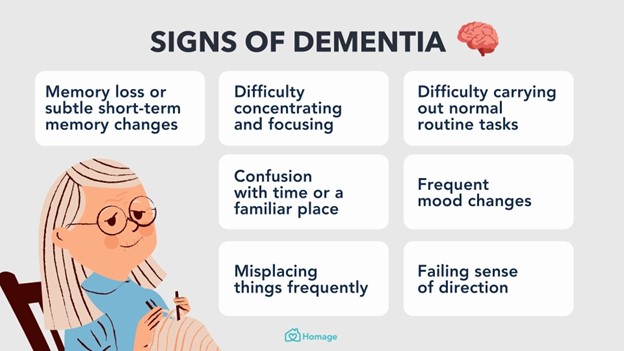A community health nurse is providing teaching to the family of a client who has dementia. Which of the following manifestations should the nurse tell the family to expect?
Decreased display of emotions
Forgetfulness gradually progressing to disorientation
Personality traits that are opposite of original traits
Decreased auditory and visual acuity
The Correct Answer is B
A) Decreased display of emotions:
While changes in emotional expression can occur in individuals with dementia, it's not a primary manifestation that is typically emphasized when educating families. Behavioral and psychological symptoms, including changes in emotion and personality, can be seen in dementia, but forgetfulness progressing to disorientation is a more direct and characteristic symptom of the condition.
B) Forgetfulness gradually progressing to disorientation
Explanation:
When educating the family of a client with dementia, the nurse should inform them to expect forgetfulness that gradually progresses to disorientation. Dementia is a progressive cognitive decline that affects memory, thinking, and reasoning. Forgetfulness is often one of the initial symptoms of dementia, and as the condition advances, individuals can become disoriented to time, place, and even people. This progression occurs due to the degeneration of brain cells and the accumulation of abnormal proteins.
C) Personality traits that are opposite of original traits:
Changes in personality traits can indeed occur as a result of dementia, but this may not be the most prominent or early manifestation that the nurse would want to highlight when educating the family. The gradual progression of forgetfulness leading to disorientation is a more specific and foundational aspect of dementia.
D) Decreased auditory and visual acuity:
Decreased sensory acuity, such as auditory and visual acuity, can happen with age and various health conditions, but they are not primary manifestations of dementia. Dementia primarily affects cognitive functions like memory, thinking, and reasoning.

Nursing Test Bank
Naxlex Comprehensive Predictor Exams
Related Questions
Correct Answer is D
Explanation
A. "Tell me about the concerns that you have regarding your relationship."
This choice is an appropriate and open-ended question that encourages the client to express their feelings and concerns. It helps in building rapport and understanding the client's perspective.
B. "Relationship difficulties are stressful and require effort to resolve."
This choice acknowledges the challenges of relationship difficulties and conveys a supportive and empathetic attitude. It is a reasonable and non-biased statement.
C. "We could develop a plan for how to talk about this with your partner."
This choice suggests a proactive approach to address the client's concerns and promote effective communication. It is a helpful and appropriate statement.
D. "You should try to see your partner's point of view before your own."
This statement implies a biased approach, suggesting that the client should prioritize their partner's perspective over their own. While empathy and understanding are important in relationships, it's not appropriate for a healthcare professional to imply that one perspective is more important than the other. The nurse should encourage open communication and understanding from both sides rather than favoring one viewpoint.
Correct Answer is ["A","B","D","E"]
Explanation
A. Hyperactivity: While some individuals with eating disorders may engage in excessive physical activity as a form of compensatory behavior, hyperactivity is not a consistent and universal manifestation.
B. Amenorrhea: Adolescents with eating disorders, particularly anorexia nervosa, often experience amenorrhea (absence of menstrual periods) due to hormonal imbalances and low body weight.
C. Verbalized desire to gain weight: Individuals with eating disorders, especially anorexia nervosa, often express a strong desire to lose weight rather than gain weight, which contributes to their restrictive eating habits.
D. Altered body image: Eating disorders are often associated with distorted body image, where individuals perceive themselves as overweight or larger than they actually are, even if they are underweight.
E. Bradycardia: Severe malnutrition, as seen in eating disorders like anorexia nervosa, can lead to bradycardia (slow heart rate) as the body conserves energy in response to the low caloric intake.
Whether you are a student looking to ace your exams or a practicing nurse seeking to enhance your expertise , our nursing education contents will empower you with the confidence and competence to make a difference in the lives of patients and become a respected leader in the healthcare field.
Visit Naxlex, invest in your future and unlock endless possibilities with our unparalleled nursing education contents today
Report Wrong Answer on the Current Question
Do you disagree with the answer? If yes, what is your expected answer? Explain.
Kindly be descriptive with the issue you are facing.
